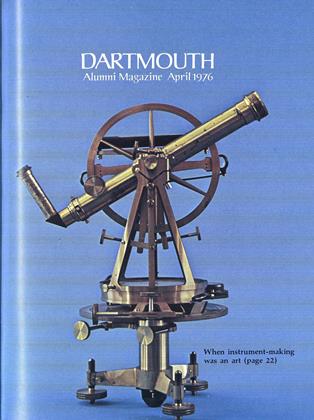One of the most significant and exciting changes on the Dartmouth scene isn't in Hanover at all. Each term Dartmouth students come back from exotic spots such as Central America, Europe, and even Washington, D.C., full of tales and new accents. Few are the undergraduates who manage to graduate from the College these days without spending at least one term in a far-off outpost, mixing the experience of travel with the more traditional academic pursuits.
As we began to wonder about winters in the Alps and springs along the banks .of the Seine, it occurred to us that the College offers its students a veritable Cook's Tour along with its vaunted A. B. degree. There is one important dimension to off-campus study that the College does not provide, however, so we decided to make some inquiries about the possibility of offering students the opportunity to study for a term in a different century.
Not wanting to bother President Kemeny before his spring trip to alumni clubs around the country, we wrote the President's student assistant and asked him to look into the matter. We pointed out that study in another century would afford many students opportunities to learn more about their disciplines. A student interested in liberalism and nationalism in Europe, for example, could spend three months or so in the 19th century. Shakespearean enthusiasts would be happy as clams at high tide in the 17th century. Art students would delight in a term in the Renaissance. And what could be better for a physics major than a term in the 21st century?
Students returning from foreign study programs say that one of the most valuable parts of their terms abroad is living with a family in whatever country they visit. That feature could be easily adapted for study in another century. While it may be difficult to make arrangements to lodge Dartmouth students with the Disraelis, the Borgias, the Metternichs, the Vivaldis, or the court of Frederick the Great, it seemed to us that some of the lesser luminaries of history might consent to putting up and putting up with Dartmouth undergraduates.
The student assistant wasn't exactly taken with our suggestion, but he did forward a polite, if bemused, reply. He said he discussed our proposal with President Kemeny and that the President was "intrigued" with the idea. "He asked me," reported the student assistant, "to assure you that once time-machines are available on the commercial market, Dartmouth will have one and Dartmouth students will be living with families in every century. We all agree that that will certainly be a positive addition to the flexibility already offered under the Dartmouth Plan."
We shared our idea and the student assistant's reply with some of our friends. One wag said he wouldn't be surprised if Dartmouth students would be interested in spending terms in other centuries. "Why else," he inquired, "would people come to Dartmouth anyway?" Another said that students who would rather attend the College in one of its previous states - before co-education or before year-round operation, for example - would have the opportunity to do so.
 View Full Issue
View Full Issue
More From This Issue
-
 Feature
FeatureWORDS AND PICTURES MARRIED The Beginnings of DR.SEUSS
April 1976 By Edward Connery Lathem -
 Feature
FeatureStrangers in the House?
April 1976 By RAYMOND L.HALL -
 Feature
FeatureLap After Grim Lap, Note After Sparkling Note
April 1976 By DAVID M. SHRIBMAN '76 -
 Feature
FeatureTHE 18th century highboys of Benjamin Randolph's
April 1976 By ALLEN L. KING -
 Class Notes
Class Notes1975
April 1976 By GILBERT F. PALMER IV, FREDERICK H. WADDELL -
 Article
ArticleVox Clamantis et Clamantis; or College Bites Man
April 1976 By TERENCE R. PARKINSON '71
Article
-
 Article
ArticleFOOTBALL
December, 1912 -
 Article
Article49 MAKE 1923 GLEE CLUB
November, 1922 -
 Article
ArticleClass Treasurer of the Year
JUNE 1970 -
 Article
ArticleTreasurer of the Year
JUNE 1973 -
 Article
ArticleKenneth F. Wlaschin '56: Three square movies a day
APRIL • 1985 By Peter K. Mose '78 -
 Article
ArticleA Time Away
OCTOBER 1981 By Rob Eshman '82

